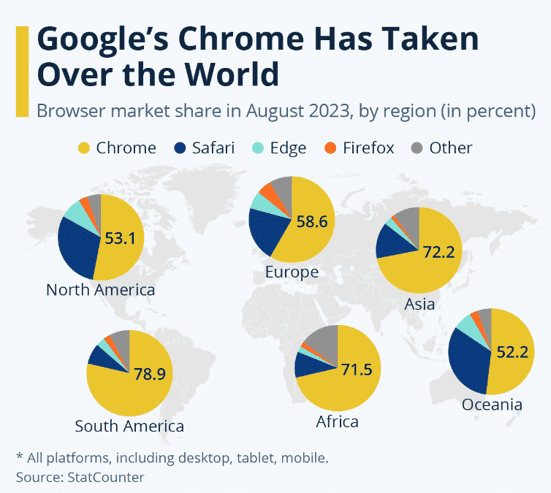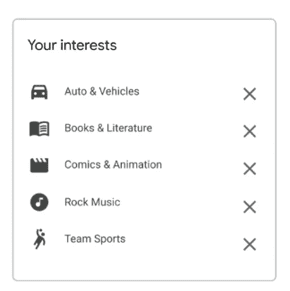3 SEO Trends to Pay Attention to This Year
Search engine optimization (SEO) is constantly evolving and the pace has shown no signs of slowing.

Google is taking a big step forward this week in its mission to eliminate third-party cookies.
Beginning Thursday, February 7th, Google will roll out a limited test to restrict cookies for 1% of its Chrome browser users, with the goal of completely eliminating cookies for all Chrome users by year-end.
As of November 2023, Google's Chrome browser was used by more than 62% of people across the globe. So this change will have a major impact on digital advertising – both in terms of who can be tracked and the cost of running ads.

Cookies have become an important part of the online experience as they allow websites to be more personalized and convenient when you visit multiple times.
Cookies can be helpful. They can remember your login information, save items to your cart for purchase later, personalize site content, and more.
But, there are different types of cookies.
First-party cookies
First-party cookies are created by the website you're visiting and are generally considered safer, as long as you visit a trustworthy website. Within these are what's known as essential cookies, which are often accepted through pop-ups that appear on a site when you first visit.

These essential cookies are used to perform those helpful tasks mentioned earlier like remembering your login information.
Third-party cookies
Third-party cookies are different and what Google is addressing with these changes. Third-party cookies are generated by websites that are different from the one you may be visiting. This is usually because they're linked to the ads that run on that page.
Third-party cookies let advertisers and analytics companies track your browsing history across the web on any sites that show their ads. Effectively creating a map of the internet that can be used to assign a profile to you.
The main issue with creating this map is that it may unveil private data such as a user's medical history, sexual orientation, gender identity, political affiliation, occupation, income, and more.
While the elimination of third-party cookies is a good thing from a consumer privacy standpoint, marketers will have to deal with several challenges.
Many programmatic media buys rely on third-party cookies for ad targeting. If third-party cookies go away, it's safe to assume that targeting may be severely impacted. This may make some advertising less expensive as it becomes less impactful from a targeting standpoint.

And while we're reluctant to put on our tin foil hats just yet, I would guess Google's elimination of third-party cookies means that we're going to see Google's search ads become more expensive by the end of the year as search ads do not rely heavily on cookies and it's easier to target based on search intent.
As an alternative to third-party cookies, Google has launched a tool named Topics.
Topics API would need to be installed on a number of websites to collect accurate data, but the idea is to assign a number of topics that best reflect a user's browsing behavior.
The topics would be determined based on the sites' hostname, but companies would be able to select the topic they want their site associated with.
Then, each week, a user would be associated with five topics, including one random topic to help prevent any personally identifiable information from leaking accidentally. Additionally, the user can control what topics they want associated with their profile.

When a user visits a site, assuming the Topics API is installed, Topics will select just three topics, one topic from each of the past three weeks, to share with the site and its advertising partners.
Each topic is then assigned to that user for three weeks, allowing ad networks to target ads against those interests. But the ads will only be able to run on websites assigned to that topic (i.e. no dog food ads on fitness sites).
There are a few things you can begin exploring today to better prepare for a future without third-party cookies.
Start Discussions with Your Media Agency
Don't wait to begin conversations with your media agency to see how they're preparing for the elimination of third-party cookies and how they anticipate it will impact your media buy.
Collect as Much First-Party Data as Possible
Increase your efforts to build your mailing lists and leverage first-party cookies to better understand and market to your audience.
Explore contextual advertising
If you can't target users based on third-party cookies, it may be worth exploring options to target specific websites based on their content. While contextual advertising may not be as precise as behavioral targeting through third-party cookies, you can at least trust that your audience is in alignment.
Sign up for our monthly newsletter to receive updates.

Search engine optimization (SEO) is constantly evolving and the pace has shown no signs of slowing.

Organic traffic plays a crucial role in generating new leads and enhancing a brand's online presence. So it would make sense that monitoring your...

The term native advertising was first coined in 2011, but the practice creating ads that fit seamlessly within the context of the channel in which...